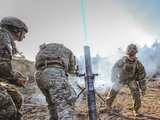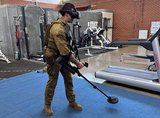Cubic tailors mortar simulator for the US Army
The company’s mortar trainer received improvements based on soldier’s feedback.
The first course will start in 2023 for the initial cohort of pilot trainees under the NFTE framework. (Photo: Euro-NATO Joint Jet Pilot Training Twitter)
Three new training campuses have been added to the NATO Flight Training Europe (NFTE) High Visibility Project, NATO announced at the end of January.
The new sites – located in Greece, Hungary and North Macedonia – have joined facilities in Czechia and Italy on the list of official training campuses for allied military pilots. This NFTE expansion project started in 2020 and was led by the Czech Republic.
‘It is an important step toward the NFTE’s long-term aspiration of building a complete aircrew training architecture in Europe, including a network of training campuses,’ NATO wrote on its website.
The alliance is planning to use the NFTE to provide training opportunities and capacity for aircrew across the whole spectrum, including fast jet, fixed-wing, helicopter and UAV pilots.
So far, NFTE can facilitate fast-jet and rotorcraft pilot training.
‘In the current dynamic and unpredictable security environment, we need competent, ready flight crews that can contribute to NATO’s ability to defend its allies in all domains,’ NATO Deputy Secretary General Mircea Geoană noted in a statement.
‘This multinational initiative will enable adaptable pilot training to the highest standards, across Europe. This will ensure that our military pilots are well-trained in state-of-the art facilities; that they are more interoperable, and that their training is more cost-efficient for their nations.’
The decision to designate the three additional training facilities was taken by the ten nations that participate in the NFTE project: Belgium, Czech Republic, Greece, Hungary, Italy, Montenegro, North Macedonia, Romania, Spain and Turkey.
NATO said that more allies are expected to join the initiative and more varied training campuses will also be added.
The first course will start in 2023 for the initial cohort of pilot trainees under the NFTE framework.

The company’s mortar trainer received improvements based on soldier’s feedback.

The company will operate in two new locations in the coming years to better support US services.

This type of tool provides more realistic training easing the incorporation of new scenarios that accurately represent the threats of the battlefield.

The Engineering Corps has been conducting individual instruction using FLAIM Systems’ Sweeper and should start collective deployments in 2025.

The next-generation platform is motion-compatible and can be used in OTW and NVG applications.

The system can be used to prepare soldiers for both drone offensive operations and CUAS missions.